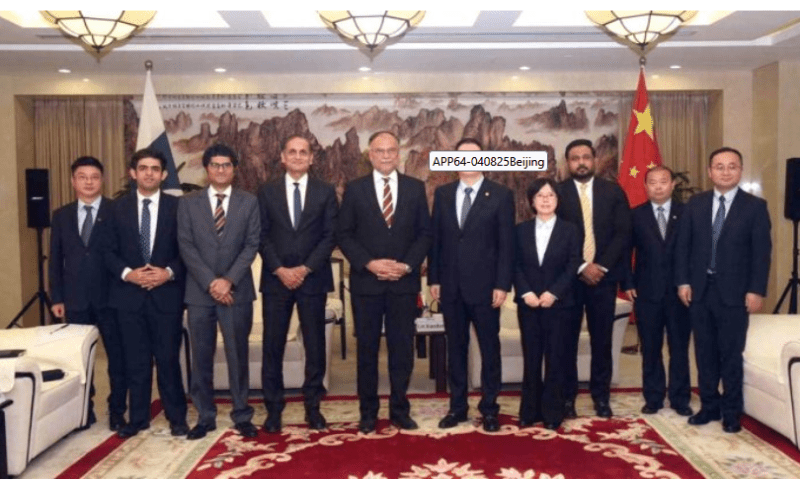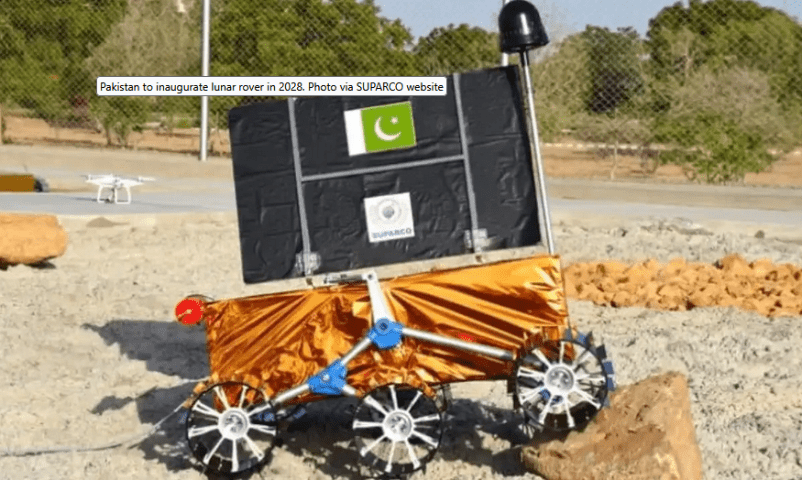Pakistan eyes its own moon landing by 2035
Pakistan will send and land a rover on the moon with Chinese cooperation, and by 2035, the country aims to achieve its own lunar landing.
This ambition was reaffirmed during Federal Minister for Planning, Development and Special Initiatives Ahsan Iqbal’s official visit to China, where he held key meetings with senior Chinese officials ahead of Prime Minister Shahbaz Sharif’s upcoming visit and the 14th Joint Cooperation Committee (JCC) session on the China-Pakistan Economic Corridor (CPEC).
During his engagements in Beijing, Minister Iqbal met the newly appointed chairman of China International Development Cooperation Agency (CIDCA) and emphasised expanding the socio-economic footprint of CPEC to uplift underdeveloped regions in Pakistan.
“China and Pakistan are working together on people-focused development. We aim to deepen this partnership and create real livelihood and educational opportunities for those in need,” he said, while addressing Chinese media.
Iqbal also met with Chinese business leaders and representatives of companies operating in Pakistan to explore opportunities for enhanced investment and business-to-business (B2B) collaboration.

He noted that while CPEC’s first phase was focused on infrastructure — comprising over $25 billion in investments that led to the addition of 8,000 MW to Pakistan’s grid and the development of critical road networks — the second phase will shift attention toward industrial cooperation, agriculture modernisation, and technology transfer.
“We have launched a program to train 1,000 Pakistani agriculture experts in China. The first 300 have completed training, while another batch is underway. This will help Pakistan modernise its agriculture using Chinese expertise,” Iqbal said.
Highlighting Pakistan’s ambition to transition from an agrarian to an industrial economy, the minister stressed enhanced cooperation in industrial sectors to bolster exports and job creation.
“Pakistan produces high-quality goods in sectors such as agriculture, garments, sports and surgical equipment. We want to build on this strength,” he added.
Iqbal also met with the heads of China’s Nuclear Authority and Space Agency to discuss expanding cooperation in peaceful nuclear technology and satellite development, especially in disaster management and agriculture planning.
Pakistan, he said, is committed to greater engagement in space exploration.
“We expect our first astronaut to go into space in 2026 aboard a Chinese mission and visit the space station in orbit. Following that, we will send and land a rover on the moon. By 2035, Pakistan aims to carry out its own moon landing mission.”
The minister described Pakistan-China relations as a unique “iron brotherhood,” stretching beyond economics into technology, space, and defense.
“Just like the Great Wall of China is visible from orbit, the friendship between Pakistan and China is visible to the world,” he said. He also acknowledged China’s steadfast support, particularly during recent tensions with India.
Pakistan and China are also planning special events next year to mark 75 years of diplomatic relations.
Iqbal underscored the importance of the upcoming Shanghai Cooperation Organisation (SCO) Summit, saying regional leaders must focus on de-escalating global conflicts that have far-reaching economic impacts.
“The Ukraine-Russia conflict disrupted global supply chains. It’s a wake-up call. Forums like SCO must promote peace, trade, and cross-cultural understanding,” he said.
He condemned Israel’s recent attacks in Jerusalem and Gaza, calling them a violation of international law and human rights.
As part of economic engagement, the Pakistan-China Business Conference will be held in Beijing on September 4, coinciding with Prime Minister Sharif’s visit.
The event is expected to attract over 250 Pakistani and 200 Chinese companies across sectors including EVs, chemicals, IT, agriculture, and solar energy.
“This will be a key platform for joint ventures, manufacturing partnerships, and industrial matchmaking,” Iqbal noted.
The minister said Chinese firms see cost advantages in manufacturing in Pakistan and expressed hope that more solar energy and EV production facilities would be established through CPEC Phase 2 collaborations.
For the latest news, follow us on Twitter @Aaj_Urdu. We are also on Facebook, Instagram and YouTube.























Comments are closed on this story.